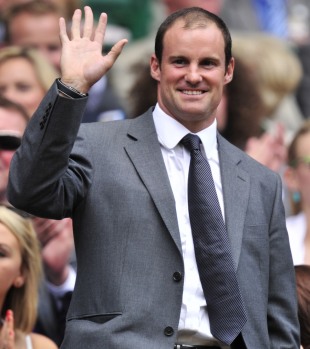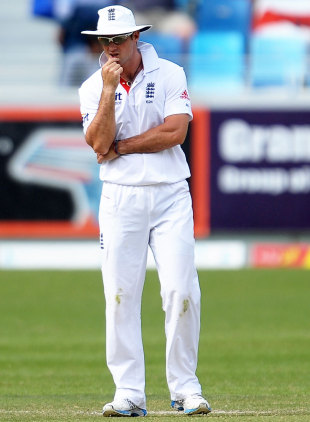by James Morgan in The Full Toss•
Nine months ago, a proud cricketing nation was in turmoil. Dressing room dissent was ubiquitous and their highly regarded captain under fire. Senior players were disillusioned with the management structure and key members of the squad even refused to do their homework (the horror!).
This is the team that recently won the Ashes 5-0. It didn’t take much to sort things out, did it. They drew a line under their disagreements – like good men do – and united in a common cause.
The Aussies didn’t look for scapegoats. They assimilated the troublemakers. They did not – I repeat not – drop their best players for complaining about the captain and coach. Had they done so, and jettisoned the likes of Shane Watson in a fit of petulance (“how dare you question us”), they wouldn’t have won the Ashes.
The Aussies knew that sacking the rebels would leave huge holes in their side. They realised they had nobody better than Philip Hughes and Usman Khawaja – players not of an international standard – to replace the rebellious big guns.
The Australians were practical. The ACB wasn’t impressed with Watson’s sulking, but they accepted that losing sides in international sport (whatever the sport) tend to argue a bit. Dissent, when all is going wrong, is a fact of life.
When faced with such crises, management teams have two options: they can either get over it, shake hands and move on, or throw the cry-baby out with the bath water and cut off their own nose to spite their face.
Although this is probably one metaphor too many, it’s clear the Ashes winners chose the first option (the difficult one which brings rewards in the long run), whilst England, the miserable losers, have chosen the latter.
England, in my opinion, have chosen the easy option: the weak, lazy and, let’s not beat around the bush here, the selfish option – in other words, putting personal prejudice, scapegoating, and making their individual lives easier, ahead of the general welfare. The ECB’s pride, and their desire to teach a rebel a lesson, has triumphed over cricketing logic.
The decision to ditch Kevin Pietersen from international cricket is a weak decision made by weak men – and it’s come about because England have a weak captain, and an even weaker management team.
Not everyone in the Aussie dressing room gets on with Michael Clarke, but he doesn’t need to be mollycoddled. Clarke and Lehmann do not need to purge strong personalities in order to create an intangible ‘team ethic’. The same cannot be said of Alastair Cook, who is lucky to retain his job, and England’s coach in waiting, Ashley Giles.
Australia has a history of good players clashing in the dressing room: Shane Warne didn’t like John Buchanan, wasn’t afraid to tell everyone, and openly admits his teammates didn’t always get along. If only they’d dropped Warne, or Matthew Hayden, in his pomp to improve the team ethic. Had they done so, we would have laughed at them.
We hear rumours about an altercation between Cook and Pietersen in Sydney, but if the Aussies had dropped every player that swore at Ricky Ponting, the Skoda driver behind the wheel of a Ferrari, there wouldn’t have been enough touring Australian players to comprise an XI. When your captain isn’t very good, there’s bound to be dissent and backbiting about tactics.
The Aussies responded to their troubles by appointing Darren Lehmann – a good egg who everyone liked. He got the players to make up, put Australia first, and stop looking for scapegoats.
Lehmann assessed the likes of David Warner – the bad boy who likes to throw punches as well as throwing his wicket away – and thought hmmm, there’s a management challenge here. He did not – I repeat not – label Warner as disruptive and throw him out of the team. Lehmann wanted his best players. Lehamann was rewarded.
So why have England’s committee done the opposite? In this observer’s opinion, it’s all down to personalities and circumstances. England’s committee consisted of newly installed chief selector James Whitaker (a nice guy new to his job), Paul Downton (also new to his job), Ashley Giles (a guy desperate for a new job), and Alastair Cook (a man fighting to keep his job).
Essentially, all these men were / are in weak positions. The last thing they need at the moment is a headache like Pietersen. They’d rather make things as simple as possible going forward.
What’s more, all of them are acutely aware that their paymasters, the ECB, want Pietersen out. Why else make the decision before a new coach has been officially appointed?! Why not let the new coach decide if he wants to work with KP?
The ECB dislike Pietersen, with his big mouth and refusal to settle for second best (think Roy Keane), as much as they love Ashley Giles, the steady eddy who goes out of his way to be amenable and smile at the right people (think Roy Hodgson, but without the experience or credentials).
It speaks volumes that a fortnight ago, Giles described KP as a million pound asset and wanted him in the side for the world T20. One meeting with the ECB later, suddenly Giles is part of a unanimous committee that doesn’t want England’s best player. Gilo has, in effect, rolled over and had his belly tickled. Funny that.
The ECB have had it in for Pietersen ever since he told them that Peter Moores was out of his depth. It matters not that Moores was indeed out of his depth, the truth doesn’t matter: it’s all about the principle of being shown up by an underling.
When England were going stale under Andy Flower and Andrew Strauss, once again it was Pietersen – arguably the hardest working and dedicated player in the side – who refused to let things lie. He might have gone about things the wrong way, but it showed he cared.
What’s more, Pietersen was spot on in his analysis (again). Andrew Strauss didn’t resign because he couldn’t work with KP. He resigned because he knew his straight-talking teammate was right: Strauss’ tactics weren’t working anymore, he wasn’t scoring enough runs, and it was time to move on.
Unfortunately, however, being right – or even being good for that matter – doesn’t matter to the ECB. Remember the time when an England selector uttered, to the fans’ astonishment, the immortal phrase: “what does Graham Thorpe bring to the England side except runs?”
And herein lies the problem. The ECB acts like a club that enjoys patting itself on the back. If you can dress correctly, say the right things, and keep your head down, then your face fits. But if you don’t suffer fools lightly, and you resent stuffiness and incompetence, you’re a loose cannon whose days are numbered.
Why else would the ECB stay married to Cook – a poor captain who scored less runs that Pietersen in Australia – and line up Ashley Giles, who has an extremely poor record but is the archetypal committeeman, as head coach?
The bottom line is this: if you took the ECB out of the equation, and concocted a recipe for Ashes success in 2015, Kevin Pietersen would probably be captain. Alastair Cook would be consigned to the rank and file. Meanwhile, Ashley Giles would be nowhere near the management team. He certainly wouldn’t have been fast tracked as a selector and then ODI coach.
For all the talk of England moving on for the right reasons, we know all the real agenda here – and it’s got nothing to do with cricket. Kevin Pietersen is the same age as Michael Clarke – the captain nobody liked. I don’t see Australia dropping their best player because they need to look forward. Clarke is 10-3 to be their leading run scorer against South Africa in the latest online odds, and will remain their linchpin until 2015 at least.
England’s best player, meanwhile, is out in the cold at the age of 33. He’s been labelled as unmanageable, but what the ECB really mean is that Cook (and probably Giles) cannot manage him.
Darren Lehmann had a dressing room full of rebels. England can’t cope with one. It’s pathetic.



